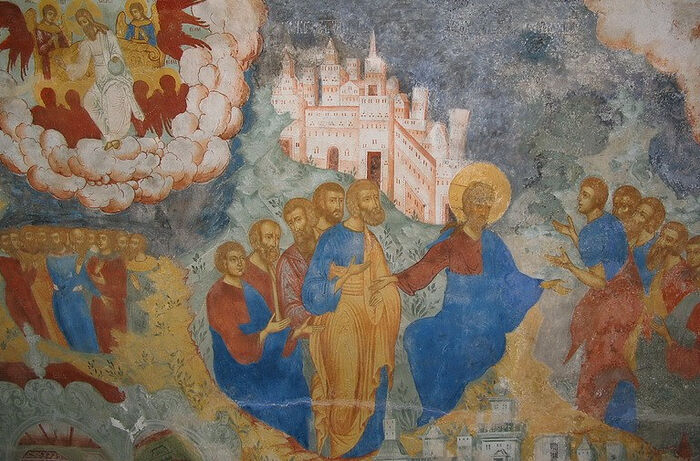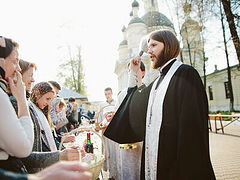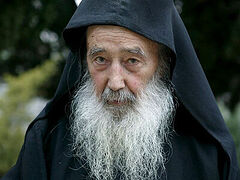 Photo: A. Tchebotar / Temples.ru
Photo: A. Tchebotar / Temples.ru
Beloved brothers, sisters and children in Christ, incline your ear—not just the external, but, more importantly, the one within, about which our Lord Jesus Christ said: He that has ears to hear, let him hear (Matt. 11:15, Mk. 4:9, Lk. 8:8); incline, I say, your ear to listening to the commandments of our Lord to attain beatitude. In the beginning, God created the human being in and for beatitude, for the beatitude that is eternal; but the sin that appeared in the world and penetrated in all people through a single person, destroyed the beatitude of the people and subjected them to damnation, all kinds of sorrows, misfortunes, diseases and, finally, temporary and eternal death. Only the infinite love of God the Creator for his fallen creature, honored to be made in the image and likeness of God, could find a way to open a return path to the lost beatitude. This way to restoration of the fallen is the incarnation, the life among people, the divine teaching and miracles, suffering, death on the cross and the resurrection from the dead of the Son of God, our Lord Jesus Christ; and the way back to beatitude lies through abiding to his teaching, adhering to his ordinances, and obedience to lawful pastors and teachers of the churches. There is no other way to beatitude, as Christ says: I am the way and the truth and the life: no one comes to the Father, but by me. I am the door: by me if any one enter in, he shall be saved (Jn. 14:6, 10:9).
How much do all of us crave for beatitude! How much do we fear and avoid sorrows and sicknesses! Though, unfortunately, we crave and seek beatitude on earth, where there is none, and not in Heaven, where it abides forever. We fear and avoid sorrows and sicknesses, while they are mostly, if not necessary, useful for us, for they heal the immortal soul suffering with many different passions. And, for sure, what beatitude can be in expulsion, in exile, in prison? This is our condition, our sins have banished all of us from paradise to this world, as though to a prison. What beatitude is there for those condemned to death?
You may say: there are many innocent pleasures on earth, which God does not forbid: for example, God gave wine that delights the heart of man, and opened the art of playing the psaltery, harp, organ, cymbals and many other musical instruments. he taught us to form choirs and sing with jubilation; he surrounded us with the birds that sing, as calling us to bliss and joy; and before our eyes he spread the majestic spectacle of nature, in which we see the joy and happiness of creatures everywhere who call us to rejoice with them.
So, by the goodness of God, in this world there are some innocent consolations for us, wounded by a sting of mortality, to relieve our wanderer’s fate and sorrows. But these consolations must used with moderation, without holding on to them in any way. We must strive for the promised beatitude through the hardest way of labor, vigil, prayer, abstinence, purity and every virtue in which it is impossible to succeed without great suffering and temptation. Brothers, our true, complete and eternal beatitude is in Heaven, where the All-Blessed God lives in unapproachable light, where the forefathers, patriarchs, prophets, apostles, hierarchs, martyrs, monks, the righteous and all the saints dwell; where the queen of Heaven and Earth, the Most Holy Mother of God, reigns together with her Son. The beatitude we have here, the earthly, bodily, and evanescent fleets like a dream; it is often coarse and impure. Only true virtue may anticipate the Heavenly beatitude on earth.
So, where can we seek the true way to beatitude? What guidance and which commandments should we observe to achieve it? Under the guidance of the Lord's nine Beatitudes, which he recounted on the mount to his disciples and people, and which are chanted or recited to us as a daily instruction at the Liturgy, at the Little Entrance, when the royal doors are opened for the first time. They read like this: Blessed are the poor in spirit, for theirs is the kingdom of Heaven. Blessed are those who mourn, for they shall be comforted. Blessed are the meek, for they shall inherit the Earth. Blessed are those who hunger and thirst for righteousness, for they shall be satisfied. Blessed are the merciful, for they shall obtain mercy. Blessed are the pure in heart, for they shall see God. Blessed are the peacemakers, for they shall be called sons of God. Blessed are those who are persecuted for righteousness’ sake, for theirs is the kingdom of Heaven. Blessed are you when people shall revile you and persecute you, and shall say all manner of evil against you falsely for my sake. Rejoice and be exceedingly glad, for great is your reward in Heaven (Matt. 5:3–12).
This is the way to true beatitude!
Next Sunday we will talk about why these Beatitudes are sung or recited at the Little Entrance and by the open royal doors. We will discover the meaning of the Little Entrance, the altar and the royal doors, for this will make the commandments on beatitude clearer. And now I ask you to remember by heart the truth that we were created by God for eternal life and eternal beatitude, which we lost through sin and were banished from Heaven, subjected to God’s damnation, and doomed to labor, sorrow, sickness and death, condemned to wandering in exile, seeking this home and beatitude. It may only be returned to us by the Heavenly Father through the intercession and merit of his beloved Son, our Lord Jesus Christ, if we have faith in Him and follow his commandments. Amen.



